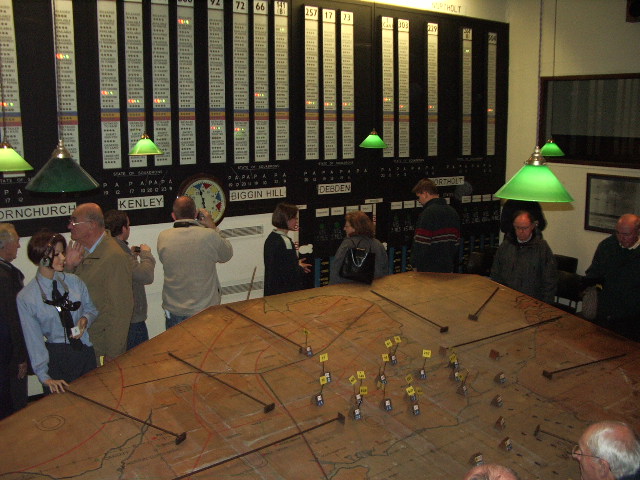I’ve been planning to write about Elon Musk’s Bowie-blasting space car ever since the video footage was transmitted back to Earth in the middle of this week. But I did not even notice until I sat down to the job that I have also been rereading Robert A. Heinlein’s “Future History” short-story cycle. This is not exactly a coincidence: I go back to the Future History every few years. This time I had one of those “Surprise! You’re old!” moments upon realizing that my cheap trade paperback of The Past Through Tomorrow, a collection of the Future History stories, must be 30 years old if it’s a day.
Written between 1939 and 1950 for quickie publication in pulp magazines, the Future History is a series of snapshots of what is now an alternate human future — one that features atomic energy, solar system imperialism, and the first steps to deep space, all within a Spenglerian choreography of social progress and occasional resurgent barbarity. It stands with Isaac Asimov’s Foundation trilogy as a monument of golden-age science fiction.
In some respects the Future History has not aged any better than one might expect. Like other young nerds who created the science-fiction canon, Heinlein was interested in rocketry before it was thought to have any practical use. And Heinlein was really, really good at acquiring or faking expert knowledge of those topics in which he happened to get interested. The man knew his Tsiolkovsky.
The result, in the key story of the Future History, is an uncannily accurate description of the design and launch of a Saturn V rocket. (Written before 1950, remember.) But because Heinlein happened not to be interested in electronic computers, all the spacefaring in his books is done with the aid of slide rules or Marchant-style mechanical calculators (which, in non-Heinlein history, had to become obsolete before humans could go to Luna at all). Heinlein sends people to colonize the moon, but nobody there has internet, or is conscious of its absence.
Colby Cosh, “Heinlein’s monster? The literary key to Elon Musk’s sales technique”, National Post, 2018-02-12.
January 9, 2021
QotD: Heinlein’s “Future History”
September 17, 2020
Britain’s technological edge in the Battle of Britain
Over at The Register, Gareth Corfield lists some of the advanced technological kit the Royal Air Force had access to during the Battle of Britain in 1940:

Restored Battle of Britain operations room in an underground bunker at former RAF station Uxbridge.
Photo by Ian Mansfield via Wikimedia Commons.
Technology played its part, mostly behind the scenes – yes, we mean the backroom boffins – in equipping Britain to hold firm and defeat the Germans. As today’s commemorations focus on the pilots and ground crew who saw off the Luftwaffe, spare a thought for the technologists whose efforts also saved the western world.
Radar and radio
Chief among the technological innovations that gave the RAF the edge was radar. In the 1930s Britain was one of the world leaders in radar (thanks in part to a bizarre and unsuccessful experiment to kill sheep with a death ray) leading to the building of radar stations all around the British coast.
Sir Robert Watson-Watt, today regarded as the father of radar, was instrumental in devising a method of bouncing radio waves off a flying aeroplane to figure out its location. He turned that 1935 concept into the fully operational Chain Home and Chain Home Low air defence networks inside four years.
Without radar, the RAF was totally reliant on humans with binoculars spotting incoming formations of German bombers; radar gave the air force an early warning capability as hostile aircraft formed up over France before crossing the Channel.
Before radar came radio direction-finding. The RAF’s Home Defence Units were first established in the 1920s and mastered the art of pinpointing an aeroplane’s location from radio transmissions made by its pilots. Though less high profile than radar, the HDUs’ activities allowed the RAF to “see” beyond the range of radar as Luftwaffe bomber formations, transmitting to each other over France, formed up ready for a raid over British soil.
Signals intelligence and compsci
Not far behind radar was the crucial role of what was then the Government Communications and Cipher School (GC&CS), based at Bletchley Park. Today the site is home to the National Museum of Computing but in the dark days of the 1940s it was where codebreakers deciphered German military communications.
Breaking Nazi Germany’s encryption was a vast task, and in the days before computers extremely labour intensive; between 9,000 and 12,000 personnel worked at Bletchley during the Second World War. The demands of RAF and other military commanders for speedy decryption of enemy messages directly contributed to the development of early computer science; Alan Turing worked at Bletchley Park, helping devise improvements to electromechanical crypto-breaking machines that resulted in the Bombe, a very early computer.
May 27, 2020
The Battle to Crack Enigma – The real story of ‘The Imitation Game’ – WW2 Special
World War Two
Published 26 May 2020For the British, breaking the Germans’ seemingly unbreakable codes is one of the most vital battles of the war. If they fail, there is litte to stop the German U-Boats hunting down Allied shipping in the Atlantic.
Join us on Patreon: https://www.patreon.com/TimeGhostHistory
Or join The TimeGhost Army directly at: https://timeghost.tvFollow WW2 day by day on Instagram @World_war_two_realtime https://www.instagram.com/world_war_t…
Between 2 Wars: https://www.youtube.com/playlist?list…
Source list: http://bit.ly/WW2sourcesHosted by: Indy Neidell
Written by: Francis van Berkel
Director: Astrid Deinhard
Producers: Astrid Deinhard and Spartacus Olsson
Executive Producers: Astrid Deinhard, Indy Neidell, Spartacus Olsson, Bodo Rittenauer
Creative Producer: Joram Appel
Post-Production Director: Wieke Kapteijns
Research by: Francis van Berkel
Edited by: Mikołaj Cackowski
Sound design: Marek Kamiński
Map animations: Eastory (https://www.youtube.com/c/eastory)Colorizations by:
Jaris Almazani (Artistic Man), https://instagram.com/artistic.man?ig…
Norman Stewart, https://oldtimesincolor.blogspot.com/
Carlos Ortega Pereira, BlauColorizations, https://www.instagram.com/blaucoloriz…Sources:
Bundesarchiv
Narodowe Archiwum Cyfrowe
IWM D 23310, A 13709, A 23513
Picture of Enigma G model, courtesy Austin Mills https://flic.kr/p/2bQ9Q
reconstructed bombe machine at Bletchley Park, courtesy Gerald Massey
Picture of Enigma M4 model displayed at Bletchley Park, courtesy Magnus Manske
Picture of John Herivel, courtesy GCHQ
From the Noun Project: Letter by Mochammad Kafi, Desk by monkik, Phone by libertetstudio, person by Adrien Coquet, Letter by Bonegolem, Table by Creative Stall, documents by Johannes Hirsekorn, sitting at desk by IYIKON, Paper by James KopinaSoundtracks from the Epidemic Sound:
Reynard Seidel – “Deflection”
Johannes Bornlof – “The Inspector 4”
Phoenix Tail – “At the Front”
Johannes Bornlof – “Deviation In Time”
Gunnar Johnsen – “Not Safe Yet”
Hakan Eriksson – “Epic Adventure Theme 3”
Howard Harper-Barnes – “London”Archive by Screenocean/Reuters https://www.screenocean.com.
A TimeGhost chronological documentary produced by OnLion Entertainment GmbH.
From the comments:
World War Two
4 hours ago (edited)
Hopefully you’re all staying safe in these difficult times. We’re still marching on so that we can keep all of you entertained when you’re stuck at home. But we can only continue doing so thanks to your ongoing support. Ad revenue has dropped significantly because of COVID, and we rely on your support now more than ever. If you can, please support us on www.patreon.com/timeghosthistory or https://timeghost.tv.Please let us know what other specials you’d like to see. And if you would like to know something about a smaller topic, make sure to submit that as a question for our Q&A series, Out of the Foxholes. You can do that right here: https://community.timeghost.tv/c/Out-of-the-Foxholes-Qs.
Cheers,
Francis
May 23, 2020
QotD: Computer trade show tchotchkes
[Computer] convention attendees have no […] problem being showered with promotional gifts from all sides as they totter up and down the rows of booths.
You can see them staggering back to their hotel rooms, arms full of corporate-branded freebies, where they have prepared an empty suitcase specifically for shipping it all back to their BOFH Central at the end of the show.
Sure, it’s all crap. It’s usually the likes of childish desk toys, cable tidies that will snap within the week, pencils and logo-shaped erasers (as if you use such items all the time, right?), and Swiss army knives that will be routinely confiscated as you pass through airport security for the trip home. No matter, just turn up to the expo and companies will toss gifts at you like you were the GitHub messiah taking a seaside donkey ride into sysadmin Jerusalem.
Well, nobody tosses any in my direction. No blotchy ballpoint pens for me. No evil-smelling pads of sticky-notes that don’t stick to anything. No spongey stress balls. No smartphone stands. No sharply angular keyfobs that stab into my bollocks when I sit down.
Me, when I visit an IT exhibition stand on the cadge, I have to provide evidence of my media accreditation, two forms of photo ID, an electricity bill, birth certificates of my family going back four generations (originals only, please) and a DNA swab before I qualify to receive a boiled sweet.
Alistair Dabbs, “‘Don’t tell anyone but I have a secret.’ There, that’s my security sorted”, The Register, 2020-02-21.
April 15, 2020
“Experts” and their “models”
In the latest Libertarian Enterprise, after offering us his current favourite mixed drink recipe, L. Neil Smith gets around to discussing our modern dependence on “experts” wielding their intricate and convoluted computer models to guide our lives:
Start with a tall glass of Mott’s Clamato over ice. Many people can’t stand the idea of tomato juice enhanced with sweet clam juice (and some spices), and I won’t try to sell you on it, here. But if you relish it the way I do (I used to buy it by the gallon), then bon appetit! Throw in a healthy shot of tequila — mine is Cuervo Gold, but your mileage may vary. Add a fat slice of lime on the edge of the glass, a slice of lemon, and a slice of orange. The citrus really dresses it up. These are all ingredients I like very much, and together, they take the edge off a day I spent writing 1000 or 2000 words (my record so far is 3200) and let me relax.
At the end of that day, when my lovely and talented wife quits work and comes home — from the dining room, these days — we have a nice, comfortable cocktail hour (she drinks Cuba Libras) and watch Tucker Carlson. Ordinarily, three giant cans of the Budweiser concoction (which is also made with Clamato) will make me the tiniest bit silly. This drink, the Bloody Mermaid (ick) is surprisingly gentle and I have had two and a half so far without embarrassing myself. I love the taste of tequila neat (many don’t), and I would still be doing shooters, except that my loving bride of 36 years won’t let me eat that much salt.
Please enjoy this silly little drink if you can until we’re all free again.
Oh yeah — I couldn’t resist after all. There’s something I need to get off my chest. I’m sure you remember the way “experts” with computer models warned us all about Y2K, and the way it meant the end of Civilization-As-We-Knew-It. Then there was Global Warming — more experts, more computer models — there are still gullible morons out there who believe it’s not an obvious hoax. Now experts and their — increasingly failing — computer models are all telling us we are in the middle of the worst health crisis since the Black Death.
I happen to be, as you know, a lifelong libertarian and the most fervid advocate of the First Amendment that you will ever read. Therefore, I cannot endorse the suggestion I’ve heard that whenever an “expert” testifies about anything before any legislative body anywhere, and the words “computer model” come out of his mouth, the Sergeant-at-Arms should smash his face in, drag him out into the street, and shoot him him the back of the head. Perhaps millions of lives could be saved that way, but, as a lifelong libertarian and the most fervid advocate of the First Amendment you will ever read, I cannot endorse that position.
So drink up, my dear friends and readers and have the best time — under house arrest — that you possibly can!
July 16, 2019
Bitcoin mining’s massive carbon buttprint
Lincoln Swann explains why Bitcoin has become a huge environmental liability as its per-unit cost-to-mine has risen:

“Bitcoin – from WSJ”by MarkGregory007 is licensed under CC BY-NC-SA 2.0
Bitcoin is more than a rather volatile imitation currency, it is also a huge energy monster.
The digital “mining” to create more Bitcoins and the recording of transactions uses up vast, crazy, amounts of electricity – something like 70TWh a year. That is about the same as Austria, say 20% of UK power consumption. As an added horror much if it is done in China where most of the power is coal generated.
All that adds up to a CO2 output from Bitcoin stuff of about 35mt a year. Planet friendly it definitely aint.
May 8, 2019
Your electronic devices and the Canadian Border Services Agency
A few years ago, many civil libertarians were upset that the US government allowed warrantless searches of electronic devices at the border, but it was less well known that the Canadian Border Services Agency does the same at the Canadian border:

“Canadian Border Sign” by jimmywayne is licensed under CC BY-NC-ND 2.0
According to the CBSA, it has the right to search electronic devices at the border for evidence of customs-related offences — without a warrant — just as it does with luggage.
If travellers refuse to provide their passwords, officers can seize their devices.
The CBSA said that between November 2017 and March 2019, 19,515 travellers had their digital devices examined, which represents 0.015 per cent of all cross-border travellers during that period.
During 38 per cent of those searches, officers uncovered evidence of a customs-related offence — which can include possessing prohibited material or undeclared goods, and money laundering, said the agency.
While the laws governing CBSA searches have existed for decades, applying them to digital devices has sparked concern in an era where many travellers carry smartphones full of personal and sometimes very sensitive data.
A growing number of lawyers across Canada argue that warrantless digital device searches at the border are unconstitutional, and the practice should be stopped or at least limited.
“The policy of the CBSA of searching devices isn’t something that is justifiable in a free and democratic society,” said Wright who ran as a Green Party candidate in the 2015 federal election.
“It’s appalling, it’s shocking, and I hope that government, government agencies and the courts, and individual citizens will inform themselves and take action.”
March 19, 2019
The dangers of over-relying on new technology
Ted Campbell discusses one of the potential problems when military organizations depend too much on new tech working as advertised by the developer:
I have been a constant critic, in these pages, and in other fora, of the Canadian military’s command and control (C²) superstructure. I believe it is overly complex and bureaucratic, too top heavy and it is ‘fat,’ even, I have said, morbidly obese. I think Canada has far, far too many admirals and generals, almost all (except for, perhaps, a half dozen, at most) being one or two ranks higher than is needed for the job they do, in too many headquarters that do little of value except talk
toat each other. I believe our C² has more do do with trying to emulate our (equally grossly obese) neighbour to the south than with meeting the needs of Canada.
The solution to the C² obesity problem is about 99% political … it needs a minister who will direct the Chief of the Defence Staff to chop something between ⅓ and ½ of the admirals and generals and commodores and Navy captains and Army and Air Force colonels and many of the HQs in which they sit. Of course that will require a massive (and overdue) revision to the entire military remuneration system so that admirals and colonels and corporals and privates, too, all get paid, appropriately well, for what they do for Canada. That needs to be agreed, by the prime minister, before the Minister of National Defence orders give the order to “chop.”But that’s the top level problem and I have, I think, ranted on enough about it … my readers will either agree or not.
I believe, as I said the other day, that there is also a serious problem at the operational and tactical levels of the military, and it involves more than just command and control (C²), it involves the command, control and communications (C³) systems and, especially, the degree to which they are reliant on modern electronics and, especially, yet again, the electro-magnetic spectrum to establish a global information network upon which the military is nearly totally reliant. When, not if, “nearly totally reliant” becomes over-reliant, as I believe is now the case, and is most pronounced, the military sometimes uses the acronym C4I, meaning command, control, communications, computers and intelligence or worse, C4I2 which means command, control, communications, computers, intelligence and interoperability according to the US Department of Defense Dictionary of Military and Associated Terms. The mere fact that we seem to want to assign fancy acronyms to a few aluminium and plastic boxes full of solid sate circuits seems to me to indicate that we don’t actually understand that, beneath the blinking lights and flashy displays is a process than, in many respects, is little changed from what we did 75 years ago. The need to manage and handle information is unchanged, the technology we can use to do those things has changed.*
The problem, as I see it, is that the modern military is fascinated with what technology can do ~ and it can do a lot of really useful things ~ but are less willing to understand its limitations.
Don’t get me wrong: I think computers are wonderful; they make many mundane but time consuming tasks easy to accomplish in the blink of an eye. Ditto for radios and radars which seem to erase distance as show us things that used to be invisible. But all technology comes at a price … sometimes, as in the world of electronic warfare (EW), the price is fairly easy to understand: if you say anything on your radio then a modestly sophisticated enemy can, quickly and accurately, locate your exact position and send artillery or sir strikes your way; or the enemy can ‘spoof’ your communications networks, feeding false information into it and spreading confusion. The enemy can, also, use the radio spectrum to gain access to (hack) your computer network and make you deceive yourself. Or the threats may be physical, like the anti-satellite networks, such as the Chinese are developing, which according to Lieutenant General Jay Raymond of the United Stares Air Force, mean that “soon every satellite in every orbit will be able to be held at risk.” Our, Canadian and allied, national surveillance and air defence systems use satellite networks as do our strategic command and control (C²) networks which manage Canada’s armed forces at home and overseas. Even the most modern “networked” systems might be rendered deaf and blind.
February 17, 2019
QotD: Nanotechnology and quantum computing
When I say Quantum Computing is a bullshit field, I don’t mean everything in the field is bullshit, though to first order, this appears to be approximately true. I don’t have a mathematical proof that Quantum Computing isn’t at least theoretically possible. I also do not have a mathematical proof that we can make the artificial bacteria of K. Eric Drexler’s nanotech fantasies. Yet, I know both fields are bullshit. Both fields involve forming new kinds of matter that we haven’t the slightest idea how to construct. Neither field has a sane ‘first step’ to make their large claims true.
Drexler and the “nanotechnologists” who followed him, they assume because we know about the Schroedinger equation we can make artificial forms of life out of arbitrary forms of matter. This is nonsense; nobody understands enough about matter in detail or life in particular to do this. There are also reasonable thermodynamic, chemical and physical arguments against this sort of thing. I have opined on this at length, and at this point, I am so obviously correct on the nanotech front, there is nobody left to argue with me. A generation of people who probably would have made first rate chemists or materials scientists wasted their early, creative careers following this over hyped and completely worthless woo. Billions of dollars squandered down a rat hole of rubbish and wishful thinking. Legal wankers wrote legal reviews of regulatory regimes to protect us from this nonexistent technology. We even had congressional hearings on this nonsense topic back in 2003 and again in 2005 (and probably some other times I forgot about). Russians built a nanotech park to cash in on the nanopocalyptic trillion dollar nanotech economy which was supposed to happen by now.
Similarly, “quantum computing” enthusiasts expect you to overlook the fact that they haven’t a clue as to how to build and manipulate quantum coherent forms of matter necessary to achieve quantum computation. A quantum computer capable of truly factoring the number 21 is missing in action. In fact, the factoring of the number 15 into 3 and 5 is a bit of a parlour trick, as they design the experiment while knowing the answer, thus leaving out the gates required if we didn’t know how to factor 15. The actual number of gates needed to factor a n-bit number is 72 * n^3; so for 15, it’s 4 bits, 4608 gates; not happening any time soon.
It’s been almost 25 years since Peter Shor had his big idea, and we are no closer to factoring large numbers than we were … 15 years ago when we were also able to kinda sorta vaguely factor the number 15 using NMR ‘quantum computers.’
I had this conversation talking with a pal at … a nice restaurant near one of America’s great centers of learning. Our waiter was amazed and shared with us the fact that he had done a Ph.D. thesis on the subject of quantum computing. My pal was convinced by this that my skepticism is justified; in fact he accused me of arranging this. I didn’t, but am motivated to write to prevent future Ivy League Ph.D. level talent having to make a living by bringing a couple of finance nerds their steaks.
Scott Locklin, “Quantum computing as a field is obvious bullshit”, Locklin on Science, 2019-01-15.
January 23, 2019
The value of boredom
I must have missed this Quillette essay by Caroline ffiske when it was published earlier this month:
In their book The Coddling of the American Mind Jonathan Haidt and Greg Lukianoff wonder where it all went wrong. How did we get to a situation where so many of our kids see themselves as fragile victims, but at the same time throw their weight around, telling the rest of us what we are allowed to think and say and do? Haidt and Lukianoff have set up a website devoted to exploring the issue and finding solutions.
I have a suggestion. It hit me like a hammer blow when I read Joseph Brodsky’s essay “In Praise of Boredom.” This was delivered as a commencement address at Dartmouth College in July 1989. Here is the opening sentence: “A substantial part of what lies ahead of you is going to be claimed by boredom.” That’s right. Joseph Brodsky, winner of the Nobel Prize for literature in 1987, assumed that these Ivy League graduates, in common with the rest of humanity since the dawn of time would face hours of the psychological Sahara of boredom that “starts right in your bedroom and spurns the horizon.”
How could Brodsky have guessed that the young people he addressed in July 1989 would be the last Western generation to live alongside boredom: in their bedrooms, on the bus, at the end of the day, and in the morning? That now, when the tiniest tips of our little fingers feel the first twinges of tedium, while the elevator travels between ground and first, we reach for our screens to become masters of fate, captains of souls, kings of new continents.
Even the vocabulary of boredom is disappearing. Brodsky lists these: “anguish, ennui, tedium, doldrums, humdrum, the blahs, apathy, listlessness, stolidity, lethargy, languor, accidie, etc.” Most of those can be excised from the Dictionary. Tell me honestly when you last used any of them?
[…]
Why? Because boredom represents your window onto infinity. And that is to say, onto your own insignificance. “For boredom speaks the language of time, and it is to teach you the most valuable lesson in your life … the lesson of your utter insignificance.” Boredom puts your existence into perspective “the net result of which is precision and humility.” The more you learn about your own size “the more humble and compassionate you become to your likes.”
Is boredom the ingredient our “snowflake” generation is missing?
October 23, 2018
Quantum Computing – The World of the Future – Extra History – #6
Extra Credits
Published on 21 Oct 2018Credit to Alisa Bishop for her art on this series: http://www.alisabishop.com/
What does the quantum revolution mean today? We talk about quantum computing application possibilities in machine learning, cybersecurity, environmental science, and more.
A tremendous thank-you to Alexander Tamas, the “mystery patron” who made this series possible. We finally found room in our busy production schedule to create and air this series alongside our regularly scheduled, patron-approved Extra History videos. A huge thank you to the multiple guest artists we got to work with, to Matt Krol for his skillful wrangling of the production schedule and keeping everyone happy, and to our Patreon supporters for your patience and support.
Support us on Patreon! http://bit.ly/EHPatreon
October 17, 2018
Quantum Computing – Decoherence – Extra History – #5
Extra Credits
Published on 14 Oct 2018Credit to Alisa Bishop for her art on this series: http://www.alisabishop.com/
Quantum computing isn’t a replacement for classical computing … yet. Quantum decoherence happens when anything gets in the way of a qubit’s job, so sterile low-temperature environments are an absolute necessity.
A tremendous thank-you to Alexander Tamas, the “mystery patron” who made this series possible. We finally found room in our busy production schedule to create and air this series alongside our regularly scheduled, patron-approved Extra History videos. A huge thank you to the multiple guest artists we got to work with, to Matt Krol for his skillful wrangling of the production schedule and keeping everyone happy, and to our Patreon supporters for your patience and support.
Join us on Patreon! http://bit.ly/EHPatreon
October 10, 2018
Quantum Computing – Spooky Action at a Distance – Extra History – #4
Extra Credits
Published on 7 Oct 2018What happens when we can’t link physical cause and effect between two actions? Well, quantum bits (or qubits) do this all the time. Let’s look into how quantum entanglement can be used in computing.
Credit to Alisa Bishop for her art on this series: http://www.alisabishop.com/
A tremendous thank-you to Alexander Tamas, the “mystery patron” who made this series possible. We finally found room in our busy production schedule to create and air this series alongside our regularly scheduled, patron-approved Extra History videos. A huge thank you to the multiple guest artists we got to work with, to Matt Krol for his skillful wrangling of the production schedule and keeping everyone happy, and to our Patreon supporters for your patience and support.
Support us on Patreon! http://bit.ly/EHPatreon
QotD: The first time ESR changed the world
I think it was at the 1983 Usenix/UniForum conference (there is an outside possibility that I’m off by a year and it was ’84, which I will ignore in the remainder of this report). I was just a random young programmer then, sent to the conference as a reward by the company for which I was the house Unix guru at the time (my last regular job). More or less by chance, I walked into the meeting where the leaders of IETF were meeting to finalize the design of Internet DNS.
When I walked in, the crowd in that room was all set to approve a policy architecture that would have abolished the functional domains (.com, .net, .org, .mil, .gov) in favor of a purely geographic system. There’d be a .us domain, state-level ones under that, city and county and municipal ones under that, and hostnames some levels down. All very tidy and predictable, but I saw a problem.
I raised a hand tentatively. “Um,” I said, “what happens when people move?”
There was a long, stunned pause. Then a very polite but intense argument broke out. Most of the room on one side, me and one other guy on the other.
OK, I can see you boggling out there, you in your world of laptops and smartphones and WiFi. You take for granted that computers are mobile. You may have one in your pocket right now. Dude, it was 1983. 1983. The personal computers of the day barely existed; they were primitive toys that serious programmers mostly looked down on, and not without reason. Connecting them to the nascent Internet would have been ludicrous, impossible; they lacked the processing power to handle it even if the hardware had existed, which it didn’t yet. Mainframes and minicomputers ruled the earth, stolidly immobile in glass-fronted rooms with raised floors.
So no, it wasn’t crazy that the entire top echelon of IETF could be blindsided with that question by a twentysomething smartaleck kid who happened to have bought one of the first three IBM PCs to reach the East Coast. The gist of my argument was that (a) people were gonna move, and (b) because we didn’t really know what the future would be like, we should be prescribing as much mechanism and as little policy as we could. That is, we shouldn’t try to kill off the functional domains, we should allow both functional and geographical ones to coexist and let the market sort out what it wanted. To their eternal credit, they didn’t kick me out of the room for being an asshole when I actually declaimed the phrase “Let a thousand flowers bloom!”.
[…]
The majority counter, at first, was basically “But that would be chaos!” They were right, of course. But I was right too. The logic of my position was unassailable, really, and people started coming around fairly quickly. It was all done in less than 90 minutes. And that’s why I like to joke that the domain-name gold rush and the ensuing bumptious anarchy in the Internet’s host-naming system is all my fault.
It’s not true, really. It isn’t enough that my argument was correct on the merits; for the outcome we got, the IETF had to be willing to let a n00b who’d never been part of their process upset their conceptual applecart at a meeting that I think was supposed to be mainly a formality ratifying decisions that had already been made in working papers. I give them much more credit for that than I’ll ever claim for being the n00b in question, and I’ve emphasized that every time I’ve told this story.
Eric S. Raymond, “Eminent Domains: The First Time I Changed History”, Armed and Dangerous, 2010-09-11.
October 8, 2018
QotD: The closed-source software dystopia we barely avoided
Thought experiment: imagine a future in which everybody takes for granted that all software outside a few toy projects in academia will be closed source controlled by managerial elites, computers are unhackable sealed boxes, communications protocols are opaque and locked down, and any use of computer-assisted technology requires layers of permissions that (in effect) mean digital information flow is utterly controlled by those with political and legal master keys. What kind of society do you suppose eventually issues from that?
Remember Trusted Computing and Palladium and crypto-export restrictions? RMS and Linus Torvalds and John Gilmore and I and a few score other hackers aborted that future before it was born, by using our leverage as engineers and mentors of engineers to change the ground of debate. The entire hacker culture at the time was certainly less than 5% of the population, by orders of magnitude.
And we may have mainstreamed open source just in time. In an attempt to defend their failing business model, the MPAA/RIAA axis of evil spent years pushing for digital “rights” management so pervasively baked into personal-computer hardware by regulatory fiat that those would have become unhackable. Large closed-source software producers had no problem with this, as it would have scratched their backs too. In retrospect, I think it was only the creation of a pro-open-source constituency with lots of money and political clout that prevented this.
Did we bend the trajectory of society? Yes. Yes, I think we did. It wasn’t a given that we’d get a future in which any random person could have a website and a blog, you know. It wasn’t even given that we’d have an Internet that anyone could hook up to without permission. And I’m pretty sure that if the political class had understood the implications of what we were actually doing, they’d have insisted on more centralized control. ~For the public good and the children, don’t you know.~
So, yes, sometimes very tiny groups can change society in visibly large ways on a short timescale. I’ve been there when it was done; once or twice I’ve been the instrument of change myself.
Eric S. Raymond, “Engineering history”, Armed and Dangerous, 2010-09-12.







